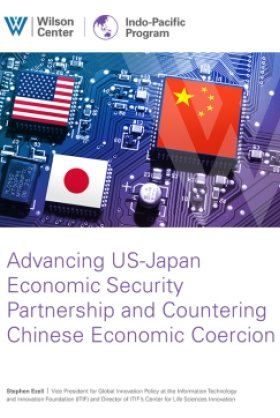Advancing US-Japan Economic Security Partnership and Countering Chinese Economic Coercion


The global competition for leadership in advanced technology industries only continues to intensify, and China has become an increasingly fierce and capable competitor across a range of high-tech industries from artificial intelligence (AI), quantum computing, and semiconductors to biotechnology, electric vehicles (EVs) and batteries, and robotics. The Chinese government aggressively supports Chinese high-tech enterprises with a wide variety of policies, many of which are well-grounded within the norms of legitimate global economic competition, such as robust financing for research and development (R&D), R&D tax credits and investment incentives, public-private research partnerships, and extensive science, technology, engineering, and mathematics (STEM) education.
Yet China also deploys a suite of what the Information Technology and Innovation Foundation (ITIF) has deemed “innovation mercantilist” policies, such as massive industrial subsidization, currency manipulation, state-sponsored intellectual property (IP) theft, and forced IP or technology disclosure (or local production, often through compelled joint ventures) as a condition of foreign firms’ access to the Chinese market. In international relations, China leverages its vast domestic market to exert economic coercion on foreign nations and their firms if they run afoul of Chinese Communist Party (CCP) prerogatives. Collectively, China’s unremitting use of innovation mercantilism and economic coercion constitute a foundational threat to both the currently constructed global trade system and to the economic well being of Japan, the United States, and other allied nations. For this reason, the United States and Japan must make a concerted effort to mutually advance their economic security and counter Chinese economic coercion, while bringing other allied nations aboard the enterprise to the greatest extent possible.
Author

Indo-Pacific Program
The Indo-Pacific Program promotes policy debate and intellectual discussions on US interests in the Asia-Pacific as well as political, economic, security, and social issues relating to the world’s most populous and economically dynamic region. Read more

Explore More
Browse Insights & Analysis
360° View of How Southeast Asia Can Attract More FDI in Chips and AI

A Case for a North American Common Tariff

